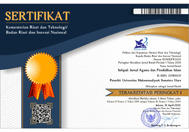Critical Analysis of the Application of Deep Learning in Islamic Religious Education: Opportunities and Obstacles
Abstract
The study aims to develop an integrated learning model that harmonizes advanced artificial intelligence technology with fundamental Islamic educational values and formulate an ethical framework guiding deep learning implementation in Islamic education contexts. This study employs a qualitative approach utilizing library research design to explore digital transformation impacts on Islamic education learning methods. Data collection was conducted through systematic exploration of contemporary academic literature published in accredited national and international journals, conference proceedings, and research reports concerning digital transformation in Islamic education and deep learning applications in educational contexts. Secondary data obtained were analyzed using content analysis methods with four sequential stages: identification and categorization of data based on relevance to digital transformation impacts in Islamic education, codification of primary findings regarding deep learning implementation, interpretation of emerging patterns and themes, and synthesis of findings to develop conceptual frameworks. The research reveals that Islamic educational institutions possess adaptive capacity to integrate advanced technology without sacrificing fundamental values. The developed integrated model encompasses four key components: adaptive technological infrastructure enabling personalized learning experiences, educator capacity development programs focusing on digital literacy and pedagogical innovation, technology-enriched curriculum design maintaining alignment with Islamic educational objectives, and an ethical framework based on Islamic principles including justice (adl), trust (amanah), and public interest (maslahah).
Keywords
Full Text:
PDFReferences
Abdar, M., Pourpanah, F., Hussain, S., Rezazadegan, D., Liu, L., Ghavamzadeh, M., Fieguth, P., Cao, X., Khosravi, A., Acharya, U. R., Makarenkov, V., & Nahavandi, S. (2021). A review of uncertainty quantification in deep learning: Techniques, applications and challenges. Information Fusion, 76, 243–297. https://doi.org/10.1016/j.inffus.2021.05.008
Alturise, F. (2020). Evaluation of the blackboard learn learning management system for full online courses in western branch colleges of Qassim university. International Journal of Emerging Technologies in Learning, 15(15), 33–51. https://doi.org/10.3991/ijet.v15i15.14199
Alzubaidi, L., Zhang, J., Humaidi, A. J., Al-Dujaili, A., Duan, Y., Al-Shamma, O., Santamaría, J., Fadhel, M. A., Al-Amidie, M., & Farhan, L. (2021). Review of deep learning: concepts, CNN architectures, challenges, applications, future directions. In Journal of Big Data (Vol. 8, Issue 1). Springer International Publishing. https://doi.org/10.1186/s40537-021-00444-8
Apostolopoulos, I. D., & Mpesiana, T. A. (2020). Covid-19: automatic detection from X-ray images utilizing transfer learning with convolutional neural networks. Physical and Engineering Sciences in Medicine, 43(2), 635–640. https://doi.org/10.1007/s13246-020-00865-4
Fasya, A., Darmayanti, N., & Arsyad, J. (2023). The Influence of Learning Motivation and Discipline on Learning Achievement of Islamic Religious Education in State Elementary Schools. Nazhruna: Journal of Islamic Education, 6(1), 1–12. https://doi.org/10.31538/nzh.v6i1.2711
Genocide, R., & Bakali, N. (2020). Educational Realities for Survivors of the. Religions, 11(241), 1–14.
Haryani, H., Astriyani, E., & Devana, V. T. (2021). Exploration of Islamic Religious Learning Innovation Technology with the iLearning Approach. APTISI Transactions on Technopreneurship, 3(2), 75–86. https://doi.org/10.34306/att.v3i2.211
Huda, S., Tsani, I., Syazali, M., Umam, R., & Jermsittiparsert, K. (2020). The management of educational system using three law Auguste Comte: A case of Islamic schools. Management Science Letters, 10(3), 617–624. https://doi.org/10.5267/j.msl.2019.9.018
Ihsan, & Fatah, A. (2021). Pancasila and islamic education: The deradicalization model of madrasahs based on islamic boarding schools in central java. Qudus International Journal of Islamic Studies, 9(1), 245–278. https://doi.org/10.21043/QIJIS.V9I1.8941
Janiesch, C., Zschech, P., & Heinrich, K. (2020). Machine learning and deep learning. Electronic Markets, 71–84. https://doi.org/https://doi.org/10.1007/s12525-021-00475-2
Lahmar, F. (2020). Islamic education: An islamic "wisdom-based cultural environment" in awestern context. Religions, 11(8), 1–15. https://doi.org/10.3390/rel11080409
Ma'arif, M. A., Rofiq, M. H., & Sirojuddin, A. (2022). Implementing Learning Strategies for Moderate Islamic Religious Education in Islamic Higher Education. Journal of Islamic Education, 8(1), 75–86. https://doi.org/10.15575/jpi.v8i1.19037
Makruf, I., Rifa'i, A. A., & Triana, Y. (2022). Moodle-based online learning management in higher education. International Journal of Instruction, 15(1), 135–152. https://doi.org/10.29333/iji.2022.1518a
Ozturk, T., Talo, M., Yildirim, E. A., Baloglu, U. B., Yildirim, O., & Rajendra Acharya, U. (2020). Automated detection of COVID-19 cases using deep neural networks with X-ray images. Computers in Biology and Medicine, 121(April), 103792. https://doi.org/10.1016/j.compbiomed.2020.103792
Sabic-El-Rayess, A. (2020). Epistemological shifts in knowledge and education in Islam: A new perspective on the emergence of radicalization amongst Muslims. International Journal of Educational Development, 73 (December 2019), 102148. https://doi.org/10.1016/j.ijedudev.2019.102148
Sukiman, Haningsih, S., & Rohmi, P. (2022). The Pattern of Hybrid Learning to Maintain Learning Effectiveness at the Higher Education Level Post-COVID-19 Pandemic. European Journal of Educational Research, 11(1), 69–81. https://pdf.eu-jer.com/EU-JER_9_1_395.pdf
Suyadi, Nuryana, Z., & Fauzi, N. A. F. (2020). The fiqh of disaster: The mitigation of Covid-19 in the perspective of Islamic education-neuroscience. International Journal of Disaster Risk Reduction, 51, 101848. https://doi.org/10.1016/j.ijdrr.2020.101848
Suyadi, Nuryana, Z., Sutrisno, & Baidi. (2022). Academic reform and sustainability of Islamic higher education in Indonesia. International Journal of Educational Development, 89, 102534. https://doi.org/10.1016/j.ijedudev.2021.102534
Yudiawan, A., Sunarso, B., Suharmoko, Sari, F., & Ahmadi. (2021). Successful online learning factors in covid-19 era: Study of islamic higher education in west papua, indonesia. International Journal of Evaluation and Research in Education, 10(1), 193–201. https://doi.org/10.11591/ijere.v10i1.21036
Zhang, C., Bengio, S., Hardt, M., Recht, B., & Vinyals, O. (2021). Understanding deep learning (still) requires rethinking generalization. Communications of the ACM, 64(3), 107–115. https://doi.org/10.1145/3446776
DOI: https://doi.org/10.30596/24275
Refbacks
- There are currently no refbacks.
Intiqad Jurnal Agama dan Pendidikan Islam is abstracting & indexing in the following databases:
View My StatsEditorial Address:
Faculty of Islamic Religion, Universitas Muhammadiyah Sumatera Utara. Jl. Mukhtar Basri No. 3 Medan 20238 Telp. (061) 6622400 ext. 27 dan 28 Fax. (061) 6625474. e-mail: intiqad@umsu.ac.id

_(1).png)























